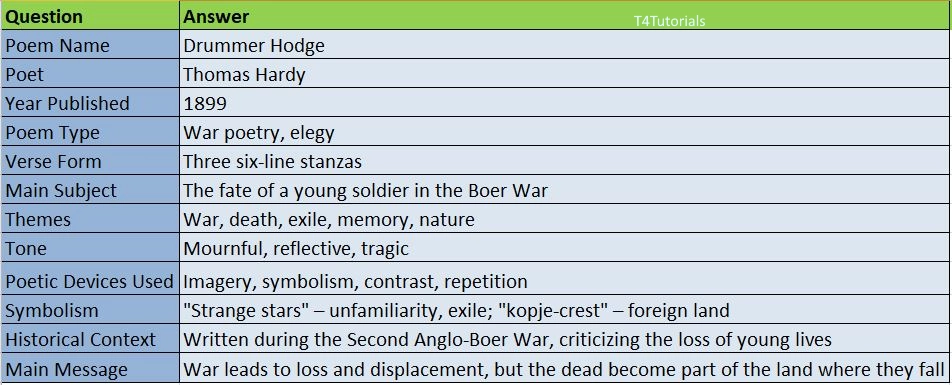Summary:
Thomas Hardy’s Drummer Hodge is a poignant poem that reflects on the fate of a young English soldier who dies in the Second Anglo-Boer War (1899–1902). The poem highlights the tragedy of war, as Hodge, a simple drummer boy, is killed in a foreign land and buried without ceremony under an unfamiliar African sky. Hardy emphasizes the contrast between Hodge’s rural English background and the strange landscape of South Africa, where he is laid to rest. The poem’s tone is mournful and reflective, focusing on themes of war, loss, and the permanence of death. Despite his tragic fate, Hardy suggests that Hodge becomes a part of the foreign land, eternally connected to the place where he fell.

Score: 0
Attempted: 0/10
Subscribe
| Question | Answer |
| Poem Name | Drummer Hodge |
| Poet | Thomas Hardy |
| Year Published | 1899 |
| Poem Type | War poetry, elegy |
| Verse Form | Three six-line stanzas |
| Main Subject | The fate of a young soldier in the Boer War |
| Themes | War, death, exile, memory, nature |
| Tone | Mournful, reflective, tragic |
| Poetic Devices Used | Imagery, symbolism, contrast, repetition |
| Symbolism | “Strange stars” – unfamiliarity, exile; “kopje-crest” – foreign land |
| Historical Context | Written during the Second Anglo-Boer War, criticizing the loss of young lives |
| Main Message | War leads to loss and displacement, but the dead become part of the land where they fall |